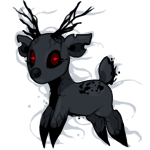Marapets is mobile friendly
Marapets is mobile friendly

On Vacation
One of the most alluring of Welsh myths is that of the Cyoeraeth (or Cyhyraeth) which, when translated into English simply means ‘the wailing.’ This creature was once deemed one of the most horrible of all supernatural beings. More often than not, the victim could only hear its pitiful moaning at a distance. If the moans of the Cyoeraeth were heard resonating along a street, it was taken to mean that more than one person was getting their card stamped, and if heard near the sea, it denoted a fatal shipwreck was in the offing. Those even less fortunate than to hear the Cyoeraeth could come face to face with it. The creature could be either male or female, and is described as having wild, dishevelled hair, black pointed teeth, long withered arms, and possessing a shriek that could turn blood to ice. Death was said to follow in its wake, though very rarely for the witness himself. Usually, a close friend or family member would be claimed instead.
 One of the most alluring of Welsh myths is that of the Cyoeraeth (or Cyhyraeth) which, when translated into English simply means ‘the wailing.’ This creature was once deemed one of the most horrible of all supernatural beings. More often than not, the victim could only hear its pitiful moaning at a distance. If the moans of the Cyoeraeth were heard resonating along a street, it was taken to mean that more than one person was getting their card stamped, and if heard near the sea, it denoted a fatal shipwreck was in the offing. Those even less fortunate than to hear the Cyoeraeth could come face to face with it. The creature could be either male or female, and is described as having wild, dishevelled hair, black pointed teeth, long withered arms, and possessing a shriek that could turn blood to ice. Death was said to follow in its wake, though very rarely for the witness himself. Usually, a close friend or family member would be claimed instead.
One of the most alluring of Welsh myths is that of the Cyoeraeth (or Cyhyraeth) which, when translated into English simply means ‘the wailing.’ This creature was once deemed one of the most horrible of all supernatural beings. More often than not, the victim could only hear its pitiful moaning at a distance. If the moans of the Cyoeraeth were heard resonating along a street, it was taken to mean that more than one person was getting their card stamped, and if heard near the sea, it denoted a fatal shipwreck was in the offing. Those even less fortunate than to hear the Cyoeraeth could come face to face with it. The creature could be either male or female, and is described as having wild, dishevelled hair, black pointed teeth, long withered arms, and possessing a shriek that could turn blood to ice. Death was said to follow in its wake, though very rarely for the witness himself. Usually, a close friend or family member would be claimed instead.
